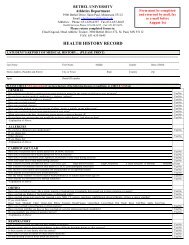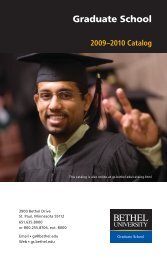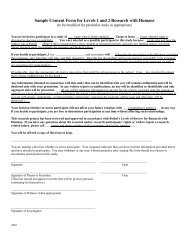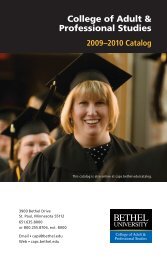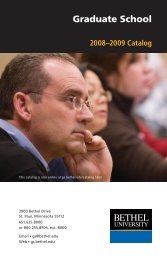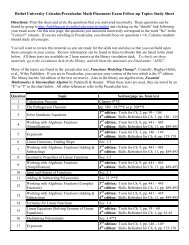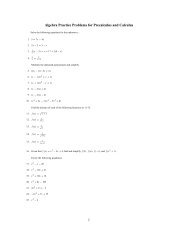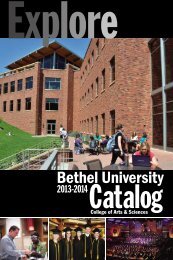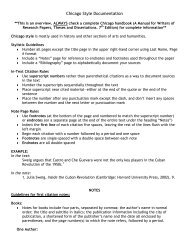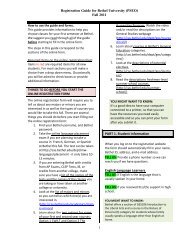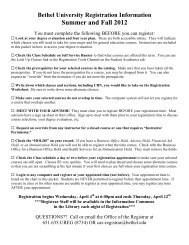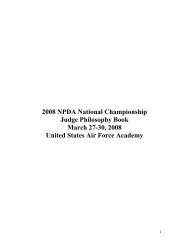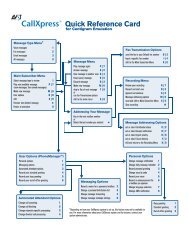Center for Biblical and Theological FoundationsSt. Paul • San Diego • Se<strong>minary</strong> of the East116TS794 (TS265) • Integrative Seminar.This course utilizes a case studiesapproach in integrating and applyingtheological truth to contemporaryissues in society and ministry. Typicalconcerns in pastoral care, Christianeducation, preaching, evangelism,and pastoral ministry are discussedfrom biblical, theological, and historicalperspectives. Students will tracetheological themes across Christiandoctrines and academic disciplines andwill write and defend a comprehensiveStatement of Faith. SemPM and InMinistryprograms in St. Paul and San Diego.Four hours.2. Contemporary TheologyTS605 (TS223) • Theology and ContemporaryCulture. This courseexplores the relation between evangelicaltheology and contemporaryculture. Special attention is placed onthe theological interpretation of “postmodernity”in its various expressionsin culture, including philosophy, art,cinema, literature, and music. Theseexpressions will be analyzed to developappropriate apologetic engagements ofpostmodern culture. Four hours.PH606 (PH241) • Apologetics. A considerationof the reasons for Christianfaith. This course proceeds in threephases, examining the possibility ofreligious knowledge, the viability oftheistic perspective, and the rationalefor the Christian w<strong>orld</strong>view. The underlyingphilosophy of this course isthat apologetics is dialogical—that conversationsoffering a rationale for faith,whether with a believer or unbeliever,happen in a context of genuine relationship.(Cognate credit with TS606.)Four hours.TS610 (TS220) • American Christianity.A historical and theological evaluationof the distinctive characteristicsof American Christianity from thecolonial period to the present, includingrevivalism, the volunteer church,expansion movements, urbanization,theological controversies, and Americandenominationalism. (Cognatecredit with HS610.) Four hours.TS626 (TS224) • ChristologicalStudies Today. Beginning with thefoundational approach to a study of majorChristological passages, the coursewill trace the Christological formulasthrough their historical development,with major reference to the contemporarysynthesis of the doctrine as it isreflected in the writings of the leadingtheologians today. Major attention willbe given to determining the relationbetween the apostolic understanding ofChristology and its expression in 20thcenturyrelevance. Four hours.TS627 (TS231) • Current Issues in theDoctrine of Salvation. This seminarwill study both non-evangelical andevangelical trends and issues in soteriology.We will explore such mattersas the move toward pluralism amongcontemporary theologians, recentexpressions of universalism, annihilationism,the “second chance” offer afterdeath, recent modifications of liberationtheology, the “Lordship Salvation”controversy, and recent expressions ofArminianism. Four hours.TS661 (TS226) • C. S. Lewis. A studyof the life and writings of C. S. Lewis,with emphasis on his theological andapologetic thought. The contribution ofthis contemporary thinker as an interpreterof the Christian faith to the modernw<strong>orld</strong> is outlined. Four hours.TS704 (TS239) • Movie Theology. Astructured workshop in theologicalevaluation of the heart and mind ofcontemporary culture as reflected insignificant motion pictures. Particularattention is paid to portrayals of the humancondition and to religious themes.The goal of the course is to cultivate theart of listening and watching perceptively,with a view to learning wheneverpossible, and to affirmation or criticismasappropriate. San Diego only. Fourhours.TS714 (TS237) • Nontraditional ReligiousMovements. A study of selectedreligious systems prominent in Westernculture today. This course will describeand react to Jehovah’s Witnesses,Church of Jesus Christ of Latter-DaySaints, the New Age movement, andother significant religious movementsthat challenge Christian thinking.Four hours.TS751 (TS230) • Seminar in ContemporaryTheology. An in-depth studyof a particular contemporary theologicalissue. Research topics to be chosenaccording to the interests of the class.Four hours.3. Philosophy ofReligion—Apologetics(St. Paul campus only)PH606 (PH241) • Apologetics. A considerationof the reasons for Christianfaith. This course proceeds in threephases, examining the possibility ofreligious knowledge, the viability oftheistic perspective, and the rationalefor the Christian w<strong>orld</strong>view. The underlyingphilosophy of this course isthat apologetics is dialogical—that conversationsoffering a rationale for faith,whether with a believer or unbeliever,happen in a context of genuine relationship.(Cognate credit with TS606.)Four hours.PH621 (PH240) • Doctrine of God.This class discusses the justification forvarious conceptions of God and addressesimportant issues in contemporarytheological discussion. (Cognate creditwith TS621.) St. Paul only. Four hours.PH651 (PH245) • Critical Thinking.A learning plan for developing criticalthinking skills. This includes classiccritical thinking strategies along withbasic work in logic including informalfallacies and basic forms of inductiveand deductive logic. Prerequisite:PH606. InMinistry M.A.C.T. only. Fourhours.PH652 (PH246) • Logic and CriticalThinking. A survey of informal logic,including informal fallacies and strategiesof critical thinking, and of formallogic, embracing deductive syllogismsand some symbolic logic. The courseapplies these strategies to w<strong>orld</strong>viewconcerns. Prerequisite: PH606. St. Paulonly. Four hours.PH654 (PH249) • Epistemology. Ananalysis of the sources, methods, andlimits of human knowing. This coursecovers classical views of knowledgeand interacts with contemporaryphilosophical discussions. It raises theproblem of knowledge in light of the
Center for Biblical and Theological Foundationscultural and intellectual developmentsbroadly classified as postmodernism.It also addresses the special problemsrelated to questions of religiousknowledge. Prerequisite: PH606.St. Paul only. Four hours.PH716 (PH247) • History of Philosophyof Religion. A selective overviewof the history of philosophy withspecial attention to religious ideas.This class will begin with the ancientGreeks, introduce several importantmedieval thinkers, highlight somesignificant philosophers, and end with20th-century philosophy of religion. St.Paul only. Four hours.PH723 (PH248) • Theology and Science.A discussion of the interfacebetween two important modes ofknowledge: theology and science. Takinga history and philosophy of scienceapproach, this course evaluates theologyand science as two different methodsfor explaining aspects of reality. Itdiscusses whether the results of sciencehave theological import or the axiomsof theology may have scientific significance.Prerequisite: PH606. (Cognatecredit with TS723.) St. Paul only. Fourhours.PH744 (PH244) • Perspectives on Eviland Suffering. This course explorestwo distinct approaches to sufferingand evil. Theologians, philosophers,and apologists try to explain why evilexists in a w<strong>orld</strong> created by a goodGod. Pastoral theologians and counselorsattempt to help people who aresuffering. Participants in this coursewill attempt integration of the categories,resources, and responses typical ofthese two areas. They will seek answersto the question, “What can theologiansand caregivers learn from each other?”(Cognate credit with TS744 or PC744.)St. Paul only. Four hours.PH750 (PH250) • Seminar in PhilosophicalProblems. An in-depth studyof a particular philosophically orientedtheologian or theological issue. Researchtopics to be pursued accordingto the interest of the class. St. Paul only.Four hours.PH790 (PH251) • Integrative Seminarin Philosophy of Religion. A researchcourse that completes the ChristianThought program. In this course, eachstudent does independent research inphilosophy of religion (or a related areaapproved by the instructor). Each studentproduces a 10,000 to 12,000-wordessay and presents the results of his orher work to the class for discussion. St.Paul only. Four hours.4. Ethical StudiesTS505 (TS105) • Christian Social Ethics.A study of the ethical dimension ofChristian theology. This class beginswith an analysis of theoretical ethics,terminology, approaches, and biblicalbases, and then concentrates on theapplication of ethical theory to specificethical issues facing Christians today.St. Paul prerequisite: TS501. TS502 recommended.San Diego and Se<strong>minary</strong> ofthe East: TS501, TS502 recommended.Four hours.TS741 (TS261) • The Ethics of War.The issues of war, violence, and resistanceto evil are examined primarily inlight of biblical revelation, with attentionto theology, history, and societalrealities. Varieties of pacifism, just wartheory, military service, and civil disobedience,among other topics, will beconsidered, with a view to answeringthe perennial question of how Christiansshould stand against oppressionand violence. Four hours.TS742 (TS262) • Sexual Ethics. Astudy of human sexual character andsexual expression from the perspectivesof Scripture, theology, history, andcontemporary thought and practice.Focuses on prevalent misunderstandingsand abuses of sexuality, as well asthe goodness of sexuality as designedby our Creator, in the lives of both marriedand single persons. Fornication,adultery, pornography, homosexuality,solo sex, celibacy, marriage, divorce,and remarriage are some of the topicswe will examine to learn how we maylive godly and satisfying lives in anincreasingly perverse society. Four hours.TS743 (TS263) • Bioethics. Which ofthe reproductive technologies, if any,are acceptable for Christians? Are allforms of euthanasia violations of God’swill? What is the Christian position onabortion, genetic engineering, cloning,living wills, medical care for the seriouslyill, and the allocation of scarcemedical resources? These and otherissues in biology and medicine will beexamined carefully from the perspectivesof science and Scripture to ascertainChristian guidelines for the bravenew w<strong>orld</strong> in which we live. Four hours.TS/MF755 (TS/MF267) • Theologyand M.F.T. Theory: An IntegrativeSeminar. This course is an investigationof human nature and Christologyfrom both theological and psychologicalperspectives. Different theories ofhuman nature are considered in relationto a theological understanding ofimago dei. The consequences of the fallon the human person and race are appraisedtheologically and clinically. Theeffect of redemption from sin throughChrist is compared and contrastedto psychopathology and therapeuticeffectiveness. Students will contemplatethe person and example of Christand explore ways in which they canbe incarnational in practice to bringabout change and healing to a hurtinghumanity. This course will assist M.F.T.students to write the senior M.F.T.paper. The class will be team taught bya theology professor and a marital andfamily therapy professor. Prerequisite:TS501. San Diego only. Four hours.5. ResearchTS670 (TS270) • Independent Study inTheology. Research in each of the areaslisted above may be pursued underindependent arrangement with the professorinvolved. (Permission is required.)Course descriptions apply toall <strong>Bethel</strong> locations unlessotherwise noted.St. Paul • San Diego • Se<strong>minary</strong> of the East117
- Page 2 and 3:
Mission and VisionBethel University
- Page 4 and 5:
Communication withSeminary Personne
- Page 6 and 7:
Bethel Seminary St. PaulCalendar fo
- Page 8 and 9:
Bethel Seminary of the EastCalendar
- Page 10 and 11:
Vision of theSeminaryWorld culture
- Page 12 and 13:
Bethel ProfileThe History ofthe Sem
- Page 14 and 15:
Bethel ProfileSpecial EducationalOp
- Page 16 and 17:
Student and Community LifeThe recom
- Page 19 and 20:
Program OverviewST. PAUL, SAN DIEGO
- Page 21 and 22:
St. PaulCAMPUS AND COMMUNITY19
- Page 23 and 24:
St. PaulThe historic Scandia Church
- Page 25 and 26:
Faculty HallFaculty Hall is central
- Page 27 and 28:
The Edwin J. OmarkPreaching Competi
- Page 29 and 30:
Degree ProgramsSt. PaulThe Master o
- Page 31 and 32:
The Master of Arts inChristian Thou
- Page 33 and 34:
gree upon students who complete the
- Page 35 and 36:
tem. Both the MA(TS) and the M.Div.
- Page 37 and 38:
In the non-concentration area, stud
- Page 39 and 40:
Clinical ExperiencePracticum Readin
- Page 41 and 42:
Pastoral Care (PC) for persons wish
- Page 43 and 44:
St. PaulMaster of Arts in Children
- Page 45 and 46:
Requirements by Degree ProgramMaste
- Page 47 and 48:
Requirements by Degree ProgramMaste
- Page 49 and 50:
Requirements by Degree ProgramMaste
- Page 51 and 52:
Requirements by Degree ProgramMaste
- Page 53 and 54:
Requirements by Degree ProgramMaste
- Page 55 and 56:
Description ofConcentrationsSt. Pau
- Page 57 and 58:
InMinistry Master of Divinity Progr
- Page 59 and 60:
Student Activities,Services, and Re
- Page 61 and 62:
their ministry goals. Service withi
- Page 63 and 64:
SanDiegoCAMPUS AND COMMUNITYPhotos
- Page 65 and 66:
embraces human diversity andcelebra
- Page 67 and 68: Degree ProgramsSan DiegoThe Master
- Page 69 and 70: The Master of Arts(Theological Stud
- Page 71 and 72: The Master of Divinitywith a Concen
- Page 73 and 74: Requirements by Degree ProgramMaste
- Page 75 and 76: Requirements by Degree ProgramMaste
- Page 77 and 78: Bottom three photos © 2000 PhotoDi
- Page 79 and 80: 5. Mentoring: Local ministry mentor
- Page 81 and 82: MetropolitanWashington, D.C. Center
- Page 83 and 84: construction of a learning contract
- Page 85 and 86: Academic PoliciesTransfer of Credit
- Page 87 and 88: Programof StudyST. PAUL, SAN DIEGO,
- Page 89 and 90: AdmissionRequirementsChristian Expe
- Page 91 and 92: or keeping library materials and da
- Page 93 and 94: of study, dates of attendance, degr
- Page 95 and 96: of one of the school’s instructor
- Page 97 and 98: Cost of Education for2007-2008Bethe
- Page 99 and 100: Refunds for the Doctor of Ministry
- Page 101 and 102: Grants and ScholarshipsStudents enr
- Page 104 and 105: The “Three Centers”Philosophy o
- Page 106 and 107: Center for Biblical and Theological
- Page 108 and 109: Center for Biblical and Theological
- Page 110 and 111: Center for Biblical and Theological
- Page 114 and 115: Center for Biblical and Theological
- Page 116 and 117: Center for Biblical and Theological
- Page 120 and 121: The Center forSpiritual andPersonal
- Page 122 and 123: Center for Spiritual and Personal F
- Page 124 and 125: Center for Spiritual and Personal F
- Page 126 and 127: Center for Spiritual and Personal F
- Page 128 and 129: Center for Spiritual and Personal F
- Page 130 and 131: Center for Spiritual and Personal F
- Page 132 and 133: Center for Transformational Leaders
- Page 134 and 135: Center for Transformational Leaders
- Page 136 and 137: Center for Transformational Leaders
- Page 138 and 139: Center for Transformational Leaders
- Page 140 and 141: Center for Transformational Leaders
- Page 142 and 143: Center for Transformational Leaders
- Page 144 and 145: FacultyCHRIS aRMSTRONG2005-Associat
- Page 146 and 147: FacultyDAN GURTNER2005-Assistant Pr
- Page 148 and 149: FacultyBrian C. Labosier1987-Profes
- Page 150 and 151: FacultyDAVID S. NAH2006-Assistant P
- Page 152 and 153: FacultyJAMES D. SMITH III1988-Assoc
- Page 154 and 155: AdministrationLELAND V. ELIASON1994
- Page 156 and 157: Faculty154Faculty Associates—San
- Page 158 and 159: AdministrationSeminary LibraryPamel
- Page 160 and 161: ScholarshipsThe Elton T. Cable Scho
- Page 162 and 163: ScholarshipsThe Elsie Knox Memorial
- Page 164 and 165: Scholarships*The Carol Vollmer Memo
- Page 166 and 167: IndexAAcademic Advising 13, 88Acade



